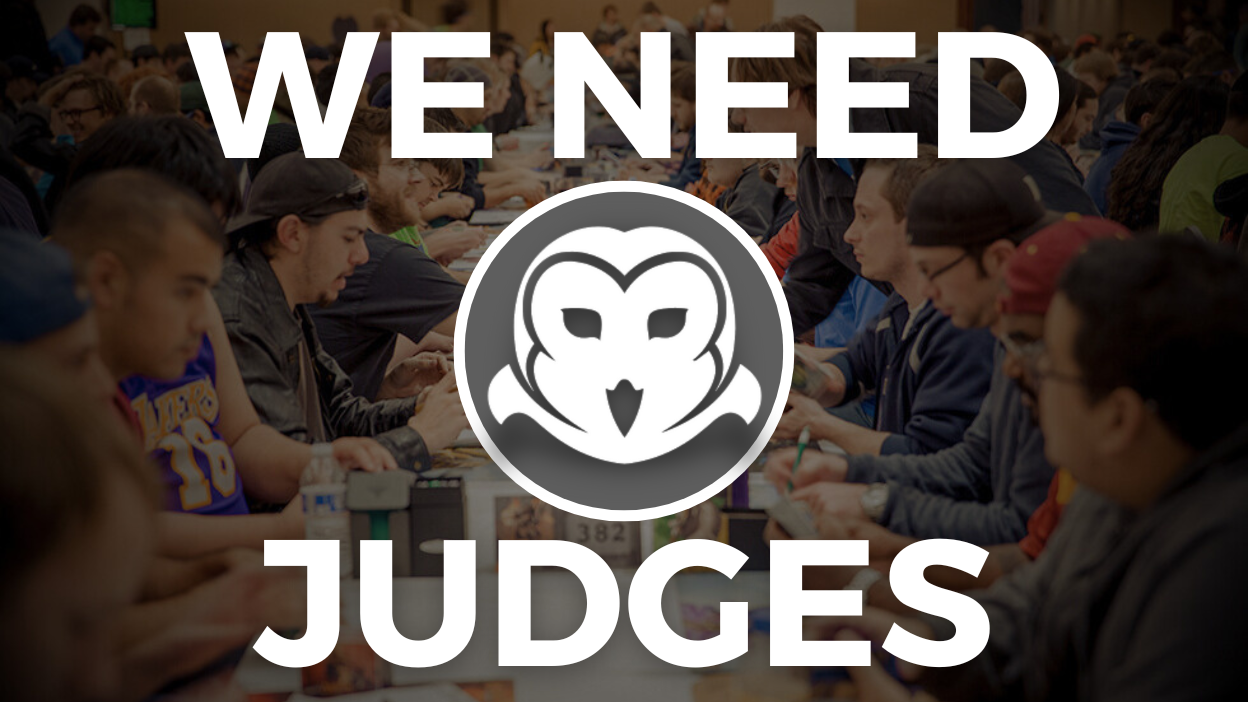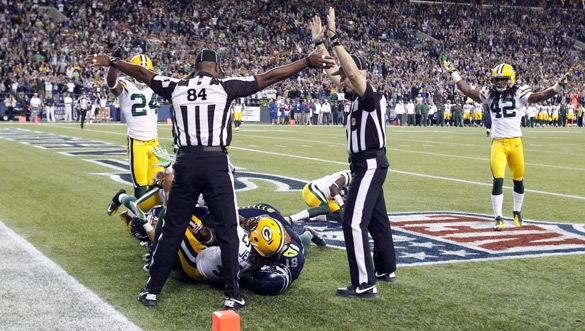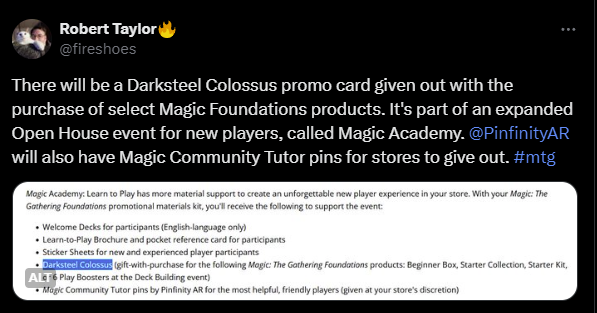Organized Play Can't Exist Without Judges

Hello, everyone! My name is Elliot Raff, and I've been an active Magic judge for the past twelve years. I have acted as the Head Judge for many events, and I have tried to be a constant resource for online questions. I have worked Pro Tours as a judge, and I've competed in them as a player.
Let me pose a question to you, dear reader: how do you get better at Magic?
It's a lot of practice, right? Jamming games, learning from your mistakes, internalizing what you are supposed to do in given scenarios? Maybe you play games with people better than you, or on Magic Online, or watch videos of your favorite content creators to see what they do that you don't. Whatever method you use, training and resources are readily available. You have the opportunity to seek out knowledge and improve your craft. From there, you can take your newfound skills to FNM, or an RCQ, or a Spotlight Series event and put your training to the test through action.
Imagine you never had access to any of those things. Your testing partners are unavailable. You don't have internet, no MTGO or Arena or videos. All you have is some decklists, maybe a sideboard guide or two. That's it: some notes, a baseline knowledge of the rules, and your guts.
Now go play a tournament. You won't do very well. You need information, and you need practice. How well can you reasonably be expected to perform if you don't have the resources to improve?
Just as there are experienced, expert Magic players, there are experienced, expert tournament officials. The issue today is that one of these groups of people is celebrated, while one is ignored and has been officially left to fend for themselves.
Last week, Wizards of the Coast announced the new Spotlight Series. Eight events will take place worldwide in 2025 that are open-entry, awarding large prize pools and Pro Tour invitations. This announcement is something that many players have been sorely waiting for, and those of us who are Terminally Online saw that There Was Much Rejoicing.
For many, the Spotlight Series is reminiscent of the old Grand Prix/MagicFest events. At its core, the idea is similar: open events that awarded large prizes and fed into Pro play. There are many differences between the two, but that's not what I want to talk about today. I want to talk about the people that make competitive events possible. I want to talk about judges.
If you're old enough to remember Grands Prix, you probably remember that Wizards of the Coast used to officially support and run a global judge program. There were positions at Wizards that dealt directly with judges, and Wizards subcontracted judges worldwide in order to conduct operations running a volunteer network that numbered in the thousands. From your local game store, to SCG Opens, to the Pro Tour, the judge program was standardized and supported by Wizards of the Coast. They provided monetary payments to certain positions, and they supplied highly-sought-after Judge Promos as "thank yous" for being on the staff of certain large events and attending conferences where judges would learn from their peers on a range of topics from rules and policy to community building.
Judges still exist today, though there is no support from Wizards of the Coast for the people that make it possible to run high-level events with integrity. All judges today are volunteers and contracted employees of the tournament organizers that they happen to be working for at the time. Some organizations exist to provide certification and knowledge sharing, but all worldwide efforts to maintain a judge "program" are being led functionally at a grassroots level by individuals trying to maintain some semblance of order. I am going to provide a brief history of how that happened, but this is really only necessary to provide context for where we might go from here.
In 2015 and 2016, two lawsuits were filed against Wizards of the Coast by, at the time, some current and former judges, alleging that their status as judges and the work that they did as judges equated to employment with Wizards. These lawsuits were eventually settled, but the legal liability eventually led to Wizards ending its direct support of their judge program. In 2019, this support officially ended, and Judge Academy was founded to pick up the slack. During Judge Academy's time, judge promos still existed and other products bearing exclusive art were available to purchase for judges. On October 13, 2023, Wizards ended its partnership with Judge Academy, and there has been no support from Wizards of any kind, that I am aware of, to the Judge community since.
Not only did the support end, but opportunity dried up. There aren't as many events as there used to be. Obviously, Wizards isn't at fault for a global pandemic. Organized Play took a major hit and has needed time to recover. What's been lost in that is that judging has taken body blow after body blow for years even prior to the pandemic and has not recovered because there is nobody helping the judge community replenish the practice and resources that it needs to maintain credibility and excellence.
So, what does this have to do with the Spotlight Series?

In 2019, there were 48 Grand Prix weekends worldwide. Each had a staff in the area of 100 personnel, many of whom worked multiple of those weekends. Many of those weekends also had conferences attached: seminars for judges to meet, network, discuss and learn. Today, there are four MagicCons per year, for which the overwhelming majority of the events are not competitive. Those staffs are in the range of 250 people. Add eight Spotlight Series events to that: how much training and experience can a single judge reasonably be expected to receive with limited other resources?
Now, I have no doubt that the Spotlight Series organizers will make every effort possible to put together an experienced staff for their events. However, they are fighting a losing battle.
The current certifying body for the United States and Canada is called Judge Foundry. They are a nonprofit organization that provides certification to judges. Their levels of certification are 1 through 5, with 5 being the highest. There are currently nineteen judges across the US and Canada that are certified as a Level 5. There are nine Level 4s and twenty-nine Level 3s. That's fifty-seven judges across the top three levels of certification for two countries. Simply put: that's not enough. Judges are no longer convinced that these certifying bodies have legitimacy because legitimacy can't be had without support from Wizards. There are many "uncertified" judges still working, but what legitimacy does that have to players? How do new judges become involved and prove themselves?
Judge Foundry, and other organizations, charge member dues to keep operating. For $5 a month, members gain certification and access to online training materials, the right to vote for board members, etc. Let that sink in. Judges - volunteers who subcontract, often for very little pay - are being asked to pay organizations in order to support a game that pays NOTHING to those same organizations, while getting nothing tangible in return. Judges are paying out of their own pocket to have an organization survive when their efforts actively make money for tournament organizers (who in fairness, do pay them) and Wizards of the Coast (who does not). That is ridiculous.
To be clear, I believe that what Judge Foundry, and other certifying organizations worldwide, are trying to do is remarkable. They are fighting to keep judging alive for the community and because they know what will happen if there is no organization whatsoever. The invested judges nowadays, to me, are heroic, and they are holding Organized Play together with their teeth. I just wish that they did not have to exist, or if they did, that they would be recognized and supported by Wizards of the Coast. For transparency's sake, I joined Judge Foundry when it was created and held a Level 4 certification. I have since canceled my membership due to conflict in ideology.
It is not possible for Organized Play to make a substantive, meaningful return without tangible support for judges. Just like playing Magic itself, resources are needed to get people interested, keep people engaged, and give them opportunities to improve. I understand that Wizards can't create large numbers of good training opportunities overnight. But there can't be nothing. Otherwise, soon enough Magic competitors will be left with the equivalent of the NFL's replacement referees during the referee strike in 2012: incompetent people in positions of power making decisions that affect games.

Any functioning judge or referee program cannot exist without support from the game that it exists to serve, and any competitive endeavor requires skilled referees in order to have legitimacy. Other games - Flesh and Blood, Pokémon, and Star Wars Unlimited - support their judge programs directly. It is absolutely possible to do. As of this moment, Wizards is not supporting its competitive endeavors, and I am afraid that, without that support, the day will come soon where tournaments will be full of Fail Marys.
Judge institutional knowledge has dwindled. Experienced judges have left the community. Fewer events (and no conferences) mean that the judges that are dedicated have fewer resources and opportunities to learn and improve. There are still wonderful, experienced judges around, but there are far fewer than there used to be, which means that less experienced judges do not have access to the resources and hands-on training they need to get better. Even if a new judge sits down and memorizes the Magic Tournament Rules and Infraction Procedure Guide in their entirety, are they qualified to be on the floor of a Spotlight Series? No. Judging takes practice, exploration, nuance, and time, just like every other facet of Magic. Judging is not a recitation of rules. It is customer service, critical thinking, working as part of a team, mentorship, and so much more.
Judges are a part of the Magic community. We don't work for the money (which isn't great). We don't work for the glory, or because we get lambasted on social media when we make a mistake. Wizards of the Coast abandoned this portion of their community and expects everything to function as normal. Judges, current and former, already know it won't. Every player who has interacted with judges, positively or negatively, knows how large of an impact a properly prepared and experienced judge can have. It is not a replacement to give friendly, helpful Magic community members pins. Come on now.

This is what I ask of you. Do not accept substandard events. As much as you would complain to Wizards about Nadu ever seeing the light of day, complain to them that tournaments are not up to your standard. Wizards of the Coast has the power to create support and infrastructure to protect the quality and integrity of their events, and it is choosing not to. In doing so, Wizards is not just abandoning the judge community: it is abandoning the competitive player community as well. Wizards is counting on the goodwill of judges in order to have a functioning, marketable competitive product, the goodwill of a group of people that it has repeatedly told "you are not our concern".
What happens when the dedicated, experienced judges out there decide that enough is enough? Many already have, and I guarantee you every single one of us who is qualified to run these large events has contemplated retiring because of the repeated signals from Wizards that it doesn't (or won't) care about the people who make events possible.
What happens when judges say "if Wizards doesn't care about us, why should we protect their events"?
Frankly, we should have said it a long time ago.
Author's Edit: I apologize for not making the following clear in the first version of the article. I know many employees of Wizards of the Coast personally. They are wonderful, kind, caring people and I admire the work that they do to produce the game that we all love. Every individual employee of Wizards that I have ever met has been very supportive of judges. Any mention of the company Wizards of the Coast in this article explicitly refers to the corporate entity, and not any individual employees.